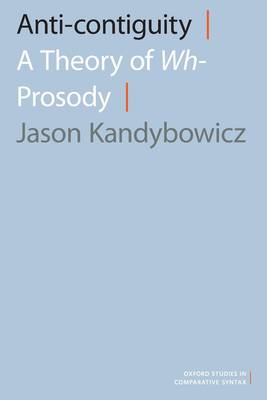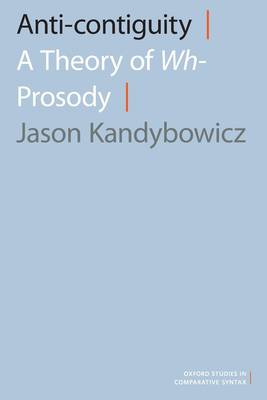
Wil je zeker zijn dat je cadeautjes op tijd onder de kerstboom liggen? Onze winkels ontvangen jou met open armen. Nu met extra openingsuren op zondag!
- Afhalen na 1 uur in een winkel met voorraad
- Gratis thuislevering in België vanaf € 30
- Ruim aanbod met 7 miljoen producten
Wil je zeker zijn dat je cadeautjes op tijd onder de kerstboom liggen? Onze winkels ontvangen jou met open armen. Nu met extra openingsuren op zondag!
- Afhalen na 1 uur in een winkel met voorraad
- Gratis thuislevering in België vanaf € 30
- Ruim aanbod met 7 miljoen producten
Zoeken
Omschrijving
A recent wave of research has explored the link between wh- syntax and prosody, breaking with the traditional generative conception of a unidirectional syntax-phonology relationship. In this book, Jason Kandybowicz develops Anti-contiguity Theory as a compelling alternative to Richards' Contiguity Theory to explain the interaction between the distribution of interrogative expressions and the prosodic system of a language. Through original and highly detailed fieldwork on several under-studied West African languages (Krachi, Bono, Wasa, Asante Twi, and Nupe), Kandybowicz presents empirically and theoretically rich analyses bearing directly on a number of important theories of the syntax-prosody interface. His observations and analyses stem from original fieldwork on all five languages and represent some of the first prosodic descriptions of the languages. The book also considers data from thirteen additional typologically diverse languages to demonstrate the theory's reach and extendibility. Against the backdrop of data from eighteen languages, Anti-contiguity offers a new lens on the empirical and theoretical study of wh- prosody.
Specificaties
Betrokkenen
- Auteur(s):
- Uitgeverij:
Inhoud
- Aantal bladzijden:
- 176
- Taal:
- Engels
- Reeks:
Eigenschappen
- Productcode (EAN):
- 9780197509746
- Verschijningsdatum:
- 1/11/2020
- Uitvoering:
- Paperback
- Formaat:
- Trade paperback (VS)
- Afmetingen:
- 155 mm x 231 mm
- Gewicht:
- 294 g

Alleen bij Standaard Boekhandel
+ 137 punten op je klantenkaart van Standaard Boekhandel
Beoordelingen
We publiceren alleen reviews die voldoen aan de voorwaarden voor reviews. Bekijk onze voorwaarden voor reviews.











